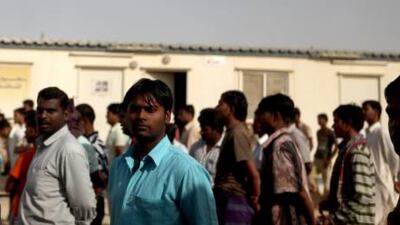ABU DHABI // They have been out of work for nearly a year, promised end-of-service benefits they never received, and denied food and regular electrical service.
The men are semi-skilled workers from India, Pakistan and Bangladesh. About 10 months ago, after working on several construction projects in Dubai, most resigned when they were not paid for at least six months.
Now, after incurring debt with local shops to feed themselves, the 400 men remaining in the Al Faya camp, about 150km east of Abu Dhabi, say they just want to go home.
"I told them, 'Please send us home, we have had no work to do for so many months now,'" said one 25-year-old worker from India. "They said, 'First give us your labour cards, let us cancel them and you will get your money to go home.' The told us to go sit in our rooms. Now our visas have expired. We have not received a salary and I have not been home in three years since I first came here."
Since then, the workers have faced a variety of challenges. A handful have continued to work in spite of not receiving their wages.
Those who chose to stop working approached the company, Al Meraikhi, to help them return home, and were advised to resign so they would get end-of-service benefits.
Officials from Al Meraikhi were not available for comment over two weeks of requests.
Although they took that step 10 months ago, they now they cannot leave the country because their visas have expired - they will be fined up to Dh10,000 at the airport upon departure. They also don't have the cash to for airfare.
"A lot of people have even left behind their end-of-service benefits. They have simply gone home," said another worker, 31, from India. "I wanted to leave as well this month, but the company keeps saying, 'Take the money and then go. This money is haram to us.'"
But the money has not come. Some of the workers have documents to prove that they are owed more than Dh27,000 in overdue wages since 2009. They have sued the company in the Dubai Labour Courts over the funds.
"For many months, no one listened to us. We went here and there and everywhere but nothing happened. Now some of the cases are still pending in Dubai," the second worker said.
Ansari Sainudeen, a lawyer representing some of the workers, said: "Most of the cases in the Dubai court are in the execution stage. But for them, right now the problem is with food and lack of transportation. They are building up more debt by borrowing from the local grocery store.
"But the most pathetic condition they are facing is that there is no transportation from where they are to the courts. They have to start their travel one day before and then spend the night in a park in Dubai before appearing in court. Then they head back the same way. It takes them three days just to come to court."
In the labour camp, although there is running water, electricity is intermittent, with workers facing long periods of the day with no air conditioning or electric fans.
In the past month, the Indian embassy has visited the camp twice, providing its country's workers with basic food staples and Dh350 per Indian.
The Bangladeshi embassy's officials also visited once, a month ago, and offered five kilograms of basic food staples such as lentils, rice and onions, according to a worker from Bangladesh.
In the past week, the workers said, the company has also stepped in and provided some food supplies, such as eight kilograms of flour divided among each four men for a week. The supplies are neither nutritious nor plentiful, the workers said.
"They may give us food from time to time, but we have no money to even buy soap. How do we bathe?" said a third worker, 29, from India. "The food packages they give us, there are no vegetables, there is nothing nutritious in it. This is their handout for us?"
The company's food packages include a kilogram of salt, a litre of vegetable oil, eight kilograms of wheat flour and a half-kilogram of lentils for each eight men. The last was delivered two weeks ago.
Under UAE law, the company is required to pay its workers electronically before the 15th of every month. It also must provide three meals a day,s helter, working water, electricity and safety equipment, plus transportation.
The Ministry of Labour launched the Wages Protection System (WPS) last year, which stipulated that all companies pay their workers through banks.
Companies not registered with the programme can no longer get labour cards for new staff. Within months of non-compliance, they are fined Dh10,000 and black points, which will make labour cards more expensive for them.
Meanwhile, supplementing the food deliveries with more nutrition means spending money they don't have at nearby shops.
"I owe [a store clerk] anywhere between Dh500 to 1,000 and he keeps a record of it. But he has stopped now. He only sells to those who are still going to work," said a worker from Pakistan.
The men have also grown increasingly worried about the state of finances of their families.
"Out of sheer shame, now we don't call home anymore. What are we going to say?" the Pakistani said. "We stopped sending money more than a year ago."
sbhattacharya@thenational.ae

